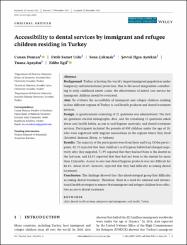| dc.contributor.author | Duman, Canan | |
| dc.contributor.author | Uslu, Fatih Samet | |
| dc.contributor.author | Çakmak, Sena | |
| dc.contributor.author | Aytekin, Şevval Ilgın | |
| dc.contributor.author | Apaydın, Tuana | |
| dc.contributor.author | Egil, Edibe | |
| dc.date.accessioned | 2023-12-13T14:16:47Z | |
| dc.date.available | 2023-12-13T14:16:47Z | |
| dc.date.issued | 2022 | en_US |
| dc.identifier.citation | Duman, C., Uslu, F. S., Çakmak, S., Aytekin, Ş. I., Apaydın, T., & Egil, E. (2023). Accessibility to dental services by immigrant and refugee children residing in Turkey. International journal of paediatric dentistry, 33(5), 423–430. https://doi.org/10.1111/ipd.13043 | en_US |
| dc.identifier.uri | https://hdl.handle.net/20.500.12900/243 | |
| dc.description.abstract | Background: Turkey is hosting the world's largest immigrant population under temporary and international protection. Due to the social inequalities contributing to early childhood dental caries, the effectiveness of dental care service for immigrant children should be evaluated. Aim: To evaluate the accessibility of immigrant and refugee children residing in four different regions of Turkey to oral health products and dental treatment services. Design: A questionnaire consisting of 21 questions was administered: The first six questions elicited demographic data, and the remaining 15 questions asked about oral health habits, access to oral hygiene materials, and dental treatment services. Participants included the parents of 430 children under the age of 18, who were registered with migrant associations in the regions where they lived (Istanbul, Samsun, Hatay, or Ankara). Results: The majority of the participants were from Syria and Iraq. Of the participants, 42.1% reported that their children's oral hygiene habits had changed negatively after they migrated, 71.9% reported that they had not been to the dentist in the last year, and 82.8% reported that they had not been to the dentist for more than 12months. Access to oral and dental hygiene products was not difficult for 68.4%. About 62.6%, however, reported that they had difficulty accessing dental treatment. Conclusion: The findings showed that this disadvantaged group had difficulty accessing dental treatment. Therefore, there is a need for national and international health strategies to ensure that immigrant and refugee children have effective access to dental treatment. | en_US |
| dc.language.iso | eng | en_US |
| dc.publisher | WILEY, 111 RIVER ST, HOBOKEN 07030-5774, NJ | en_US |
| dc.relation.isversionof | 10.1111/ipd.13043 | en_US |
| dc.rights | info:eu-repo/semantics/openAccess | en_US |
| dc.subject | Çocuk | en_US |
| dc.subject | Child | en_US |
| dc.subject | Diş sağlığı hizmetleri | en_US |
| dc.subject | Dental health services | en_US |
| dc.subject | Göçmenler ve göçmenler | en_US |
| dc.subject | Emigrants and immigrants | en_US |
| dc.subject | Ağız sağlığı | en_US |
| dc.subject | Oral health | en_US |
| dc.subject | Türkiye | en_US |
| dc.subject | Turkey | en_US |
| dc.title | Accessibility to dental services by immigrant and refugee children residing in Turkey | en_US |
| dc.type | article | en_US |
| dc.department | İstanbul Atlas Üniversitesi, Diş Hekimliği Fakültesi | en_US |
| dc.authorid | Canan Duman/0000-0003-1240-1285 | en_US |
| dc.contributor.institutionauthor | Duman, Canan | |
| dc.identifier.volume | 33 | en_US |
| dc.identifier.issue | 5 | en_US |
| dc.identifier.startpage | 423 | en_US |
| dc.identifier.endpage | 430 | en_US |
| dc.relation.journal | International Journal of Paediatric Dentistry | en_US |
| dc.relation.publicationcategory | Makale - Uluslararası Hakemli Dergi - Kurum Öğretim Elemanı | en_US |

















